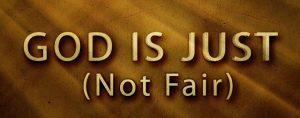By Barbara Dahlgren
One More Year of Choices
 Is God fair? Probably not – at least not by human standards…
Is God fair? Probably not – at least not by human standards…
If I had a chocolate cake and eight children who wanted dessert, I would probably take great pains to make sure I cut eight pieces of cake precisely the same size so each kid would have the same portion. I know each child would be comparing his/her slice of cake with the others to be sure someone didn’t get a bigger piece. That’s human fairness, but God is not human.
God is God. If God had the cake, He might make all the slices different sizes. Maybe we would get the size we wanted, or maybe not. You see, God is not as interested in us getting the same portions as He is in giving us what He knows we need.
I’m reminded of the parable of the landowner in Matthew 20:1-16, which is not my favorite parable, since I have a keen sense of (human) fairness. This is the parable about the land owner who hires a group of workers for the day and pays them the going rate for a day’s work, which in those days was twelve hours. Because he needed to harvest his grapes that day, he kept hiring more workers throughout the day. He even hired some at the last hour of the day, the eleventh hour. However, he paid all the workers for a full day’s work. Well, naturally those who had worked for twelve hours were a little upset that those who only worked for one hour got the same pay. I must admit that from a human perspective I would probably be griping right along with those who felt underpaid.
Humans judge fairness by comparing with one another. We say things like, “He’s got more than me and that ain’t fair!” In this passage the workers who labored all day said, “We worked longer, harder, and in the heat of the day, yet these guys who came to work for only one hour late in the day got the same pay as us. That ain’t fair!” The problem came when they started comparing what they got paid with what the others got paid. The Bible says it’s not wise to compare. (2 Corinthians 10:12) All the laborers got exactly what they signed up for.

Of course, this is not a true story. It’s a parable, an illustration Jesus used to help the disciples understand a principle. It starts with “the kingdom of Heaven is like…” The landowner represents God and the workers represent us. At the end of the story, the landowner (God) basically says, “I did you no wrong. I paid you what you agreed to work for. It’s my land. It’s my money! I can do what I want with it.”
Consider this: God is God and we are not. His thoughts are not our thoughts. (Isaiah 55:8) God has reasons for what He does, but He doesn’t always share those reasons with us. Our values and God’s are not always the same. We may value the wages, the money. Perhaps God values the harvest, the fruits of our labor, and what we learn spiritually.
This parable illustrates the Christian journey. Some of us become Christians early in our lives and some become Christians later in life, during the last hour. Are we who’ve followed Christ longer upset because the eleventh hour Christian receives the same reward? By human standards it doesn’t seem fair. But God is not human. God is God. God will have mercy on whomever He will have mercy. (Romans 9:14-16) It’s not a matter of fairness. It’s a matter of trusting a God of love.
Suggestions for practicing this choice…
Keep your life in perspective and don’t compare it with the lives as others. As Erma Bombeck used to say, “The other guy’s grass may be greener because it’s growing over a septic tank.”
Ask God to help you trust and rely on Him, rather than circumstances.
If God gave us what we deserved, we’d be dead. All have sinned and the wages of sin is death. (Romans 3:23; Romans 6:23) Always remember that God is a merciful God. Do we want a fair God or a merciful God????
Remember that everything belongs to God. Who are we to question how He uses His resources?
Repeat this often: God is God and I am not!


